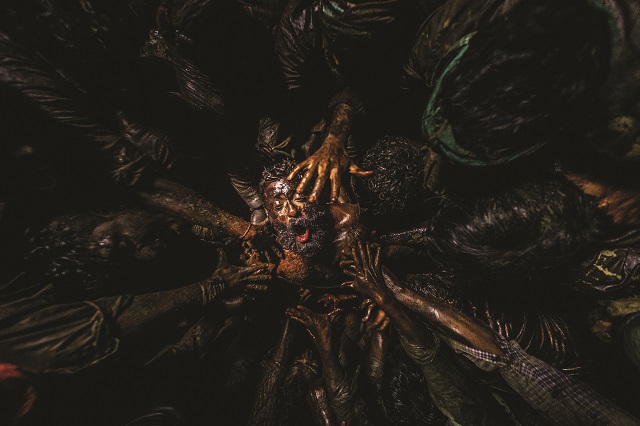 The first day of the London film festival finally arrived and I had almost forgotten, after a year abroad, the hardships of London Public Transport. A massive overcrowding in the Northern Line prevented me from being on time for the press screening of the opening gala , Armando Iannucci’s adapting Dickens in ‘The Personal History of David Copperfield,’ which I’ll try luck later on the week with one of its public screenings. Instead, I opted for an Indian film, Jallikattu, which turned out to be quite a unique experience not for the faint-hearted. Yesterday I also caught up with Rose Glass’ disturbing first feature, Saint Maud, and the latest and rather good work by Canadian (former) wunderkid Xavier Dolan, Matthias et Maxime. Here’s my chronicle of those films
The first day of the London film festival finally arrived and I had almost forgotten, after a year abroad, the hardships of London Public Transport. A massive overcrowding in the Northern Line prevented me from being on time for the press screening of the opening gala , Armando Iannucci’s adapting Dickens in ‘The Personal History of David Copperfield,’ which I’ll try luck later on the week with one of its public screenings. Instead, I opted for an Indian film, Jallikattu, which turned out to be quite a unique experience not for the faint-hearted. Yesterday I also caught up with Rose Glass’ disturbing first feature, Saint Maud, and the latest and rather good work by Canadian (former) wunderkid Xavier Dolan, Matthias et Maxime. Here’s my chronicle of those films
The first film I have seen in this edition has meant my discovery of Malayalam filmmaker from Kerala Lijo Jose Pellissery, who is already on his seventh feature and has a very personal filming style that mixes Indian and Western influences. ‘Jallikattu’ is named after a rather brutal local tradition, sort of an Indian counterpart to the Hispanic bullfighting, in which a bull is released into a crowd of people and the participants attempt to grab the hump of the bull’s back hanging to it while it tries to escape. In this case, it is a buffalo in which many members of the rural community where it happens have a vested interest, from the owners to the family organising a wedding and hoping they would prepare a big curry using its meat to treat their guests. The beast ruins crops and cause havoc on its run, and the rumour goes around so there’s a growing number of men going on the hunt for it.
Pellissery has a penchant for non linear narrative as well as a peculiar in your face editing technique imposing a vertigo-inducing fast pace to the visuals. The story often moves forward through assembling short scenes that provides the minimum, necessary flashes of information about the characters, the situations involved and their context, enhanced by an intense soundtrack and sound design. But the story seems somehow secondary and limited to the showcase of an increasingly violent beast hunt, whose aggression spreads around and evolves into man to man conflicts too. Altogether Jallikattu is an extraordinary sensorial overload; a carnival of violence shaping up a viewing experience that serves as a damning reflection on mankind’s beastly nature, with the cruelty and destruction it involves.

My second film of the day was ‘Saint Maud’ one of the films in this year’s competition. It marks the very promising debut feature of UK filmmaker Rose Glass. Saint Maud is a disturbing thriller, telling the story of a nurse (an impressive turn by Morfydd Clark) leaving behind some professional trouble on her former job in an hospital, to dedicate herself to the private care of a famous and decadent ex-dancer (played by an equally excellent Jennifer Ehle), afflicted by sickness and retired to a mansion in the hill of a coastal town.
Maud’s obsession with religion, mixed by a sparsely revealed psychological trauma, takes her to adopt as a personal goal the saving of the dancer’s soul. Particularly as she gets to know some of her acquaintances and lovers, and a lifestyle that is on the opposite side of the godly virtue and austerity she tries to pursue. As their relationship evolves, and the nurse’s grip on reality fades, Glass deftly resorts to tropes from nurse/patient and body horror to increasingly chilling effect, creating a hallucinatory Goth tale whose atmosphere and impact remains in your mind far after you have seen the film.

And the last film I watched yesterday came from a far more seasoned director, Canadian Xavier Dolan, who shakes off the bad critics obtained by his former work ‘The Death And Life of John F. Donovan’ with a simple but rather affecting tale of repressed feelings between goods friends, ‘Matthias Et Maxime,’ in which Dolan also stars as Max.
It shows the gatherings of a group of friends (or as the sister of one of them puts it, ‘Bros’) at the time of their lives in which adolescence is ending and they are facing the next step of their lives. Max, due to lack of opportunities, has decided to go to Australia for two years, and the group is preparing different celebrations for his sent off. One of their friends is making a short film and through a lost bet the two protagonist end up being part of it and shooting a scene in where they kiss, which begins a strange process of emotional detachment from Matt.
Nicely observed, rather restrained and not falling into his habitual spells of melodrama, ‘Matthias et Maxime’ is a touching, rather romantic study of male friendship that brings to mind stories of impossible male affection such as Alfonso Cuarón’s ‘Y tu Mamá también.’ It thrives on the depiction of family and friends gatherings, particularly those where veteran female characters are involved, as well as that of male characters fighting the traditional impositions society throws at them.